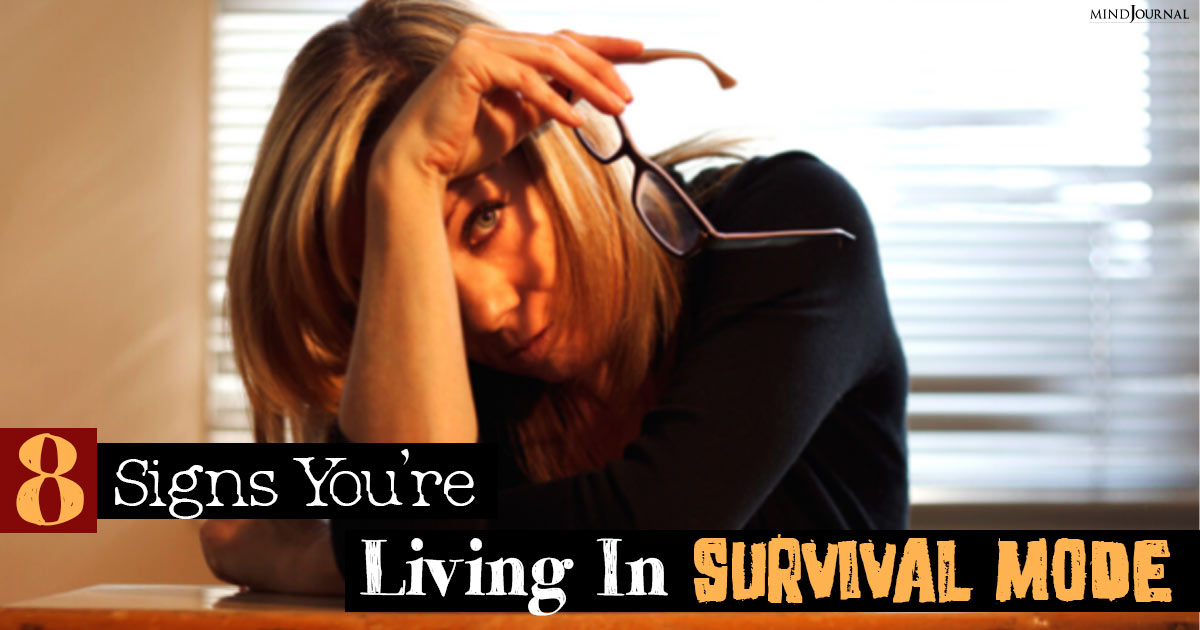Does it ever feel like your daily life is just a never-ending grind? Do you always find yourself stuck in survival mode, doing everything possible to make it through the day? If that sounds like you, or you resonate with this feeling, then these are signs you are living in survival mode.
However, don’t worry, because you’re not alone. Many people go through this at least once in their lives. But the question is, how do you break out of this survival mode mentality?
In this article, we are going to talk about 8 major signs you are stuck in survival mode, and also provide you with a few tips and strategies about how to get out of survival mode.
It’s time to break free from the shackles of your mind and instead of just surviving, you are going to survive and thrive!
Related: 5 Mental Exercises That Can Help Resolve Emotional Issues
8 Prominent Signs You Are Living In Survival Mode
1. You tend to lose your cool quite easily.
Picture this: You’re with your significant other and everything feels perfect. You had a wonderful day spending time with each other, and think that nothing can ruin this amazing day you had, but then… they leave one dirty dish in the sink and all hell breaks loose.
If things as little as that lead you to lose your temper, or if you feel that even the littlest of things leads to fits of anger throughout the day, it’s one of the biggest signs you are living in survival mode.

2. You have an erratic sleep schedule.
Living in constant survival mode means your sleeping habits, sleeping patterns and sleep schedule go for a toss. You might feel tired all day, but as soon as you lay down to go to sleep at night, sleep eludes you, and you feel wide awake.
Eventually, if you do fall asleep you’ll not be able to stay asleep for long or wake up feeling completely exhausted and drained as if you slept on rocks.
3. You have no control over your emotions.
When you are stuck in survival mode, you tend to struggle with your emotions, and more often than not, you have no control over them. So when something does happen, even the smallest of things can trigger you.
For example, your partner, out of concern, might remark that you look tired, and without skipping a beat you snap back with “Yeah? So what?” or you might blame others for things that are clearly your fault.
4. You don’t enjoy anything anymore, and nothing feels good enough.
Going from being able to enjoy all sorts of activities to now everything not being “good enough” can take a major toll on you mentally, and even emotionally. You always feel like simply enjoying something is impossible.
The new outfit you bought doesn’t look good anymore like it did in the trial room. Your favorite restaurant doesn’t feel comforting anymore. Even though you finally got the promotion you worked so hard for and now that you’ve got it, you feel like you don’t deserve it.
Related: Exhausted! 10 Signs You Are Tired Of Life (And How To Cope With It)
5. You’re constantly feeling overwhelmed.
When you have a survival mode mentality, you will notice that you feel overwhelmed by nearly everything. Although it does come in waves, everything just feels too much, and this feeling just doesn’t seem to leave you.
It feels like you’re carrying the weight of the world on your shoulders and taking on even one more thing will cause you to collapse. When you feel like this, you often don’t know what to focus on first because everything seems so important.
6. You feel like you’re losing your memory because you keep forgetting things.
Another one of the major signs you are living in survival mode is when you feel as if you are going crazy and losing your memory. The reason for this is that your mind feels like it’s racing and pulling you in a thousand different directions. Your thoughts are all over the place when it comes to what you’re doing, making it impossible to focus on one thing.
Therefore, you struggle to remember things or keep information stored in your brain. There may even be times when you are talking, and suddenly you lose your train of thought and forget what you were talking about mid-sentence.
This can make you feel anxious and embarrassed, which then leads you to overthink about what just happened.

7. You tend to log out from the real world often.
Suppose you’re in an important work meeting, but you just can’t bring yourself to focus, No matter how hard you try, you just can’t pay attention to what’s going on around you.
Drinking some coffee doesn’t work. Splashing some cold water on your face doesn’t work. Nor does rubbing your eyes.
And suddenly when someone from that meeting calls on you and asks you a question, you feel lost. You start panicking and somehow stutter out an answer and then feel even more embarrassed. Constantly zoning out proves to be inconvenient and humiliating every time it happens.
8. You feel like you can’t stop.
When you are stuck in survival mode, the idea of stopping or taking a break feels like life or death; you feel like if you stop, everything will fall apart. That’s why, when you suffer from survival mode mentality, it can be incredibly hard to relax because there’s always a sense of needing to do something, and a feeling of doom.
You feel very uncomfortable when you have nothing to do, often struggling with anxiety, guilt or loneliness that surfaces as a result.
Now that we have discussed the signs you are living in survival mode, let’s talk about how to get out of survival mode.
Related: What Is Emotional Burnout And Ways To Replenish Your Energy
How To Get Out Of Survival Mode? 6 Useful Strategies
1. Acknowledge that you are living in a constant survival mode.
The first step to break out of survival mode mentality is admitting that you are in one. Reflect upon your current mental and emotional state, and try writing down what has happened so far, and how you’ve been feeling.
Additionally, reflect on what’s happening in your body, mind, and environment by checking in with yourself regularly and documenting everything that you observe. This practice will help you understand the quality of your mental health better.
2. Prioritize self-care.
It’s crucial to take care of yourself if you are seeing signs you are living in survival mode. Practicing habits that benefit your physical, mental, and emotional health can help this process along.
Self-care can be something as small as a five-minute breathing exercise or going for a short walk without your phone.
You can also practice guided meditations, which can be really helpful for your stress and anxiety.
3. Try to avoid stressors and triggers.
The reasons for living in constant survival mode can be many, and it might look different for different people. For some, it might be work-related pressure and long hours. For some people, it might be emotional problems and family issues.
No matter what the reason might be, one way to decrease stress levels is to set strict personal boundaries, so that you can avoid things and situations that trigger your survival mode mentality.
Take breaks whenever you feel like you are getting too stressed out and overwhelmed, and don’t hesitate to stay away from situations that irk you.

4. Don’t feel shy or ashamed to ask for help.
Always remember that asking for help shows strength. When you feel stressed out or triggered, reaching out to a friend, family member, or therapist can provide valuable support and perspective.
Sharing your experiences and feelings with someone who cares can be incredibly relieving and provide some new insights and coping strategies.
Remembering that you don’t have to face challenges alone is important too. Seeking support is an important step towards managing stress effectively, and breaking out of the survival mode mentality.
Related: 5 Steps To Quiet The Mental Noise
5. Show kindness and compassion towards yourself.
This is one of the most important tips, if you’re wondering how to get out of survival mode.
Reminding yourself that everyone goes through tough times and it’s okay to not have everything under control is super important.
Living in constant survival mode is a response to stress, not a personal failure, so acknowledging your feelings without judgment can prove to be really helpful.
6. Try to create a daily routine that helps you feel calm throughout the day.
Having a daily routine can provide you with a sense of order and normalcy. It will also help you bring balance into your days.
You can start by setting up a simple morning routine like stretching or eating breakfast early in the morning before going to work, so that you feel calm and refreshed.

Takeaway
“Change is painful, but nothing is as painful as staying stuck somewhere you don’t belong.” — Mandy Hale
Living in constant survival mode is a tough way to live life, because it has a way of wearing you down in every way imaginable. Recognizing and understanding the signs you are living in survival mode is the very first step to getting back to where you want to be.
If you resonate with most or all of the signs here, then you need to take a deep breath, take a step back and be a bit kinder to yourself. Please reach out for help if needed, and rely on your close ones and loved ones.
There’s always light at the end of the tunnel, and you will definitely break out of this painful situation you’re in.











Leave a Reply